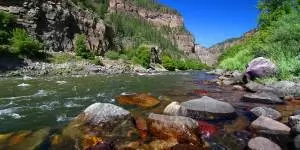
Hydrologists study how water interacts with the earth's crust. For example, they may study how rainfall and snowfall cause erosion, create caves, percolate through soil and rock to become groundwater, or eventually reach the sea. They may also study how precipitation affects people by influencing river levels or groundwater availability. Hydrologists also help investigate contaminated sites to assess how water flow might disperse pollutants, or how polluted water can be remediated.
Groundwater hydrologists study the water below earth's surface. Most groundwater hydrologists focus on cleaning up polluted groundwater at industrial contamination sites. Others work on water supply, siting new well locations and estimating amounts of water available for pumping. They often help determine the locations of new waste disposal sites to prevent groundwater contamination.
Surface water hydrologists study above ground water sources such as streams, lakes, and glaciers. They may work with usage and precipitation data to estimate water levels in reservoirs. Their estimates help reservoir managers make decisions about storing and releasing water to meet demand. They also create flood forecasts and help develop flood management plans.
Most hydrologists develop specialties, such as glacial meltwaters or groundwater remediation.
What Do Hydrologists Do?
Most hydrologists collect water and soil samples and measure their properties. For example, they may record water volume, velocity, pH levels, and pollutant levels. They may also analyze data to assess the environmental impacts of pollutants, erosion, sedimentation, drought, other water-related issues, and research ways to minimize their effects. Hydrologists use computer models to forecast future conditions concerning water supplies, the spread or remediation of pollution, floods, and other events. They may also assess the suitability of new hydroelectric power plants, irrigation systems, and waste water treatment facilities.
Hydrologists often use advanced computer technology in their work. For example, they may use remote sensing equipment to collect data, and geographic information systems (GIS) to create maps. They also develop and use sophisticated computer models to analyze large datasets.
Hydrologists often cooperate with others to manage water supplies. For example, they may work with engineers and scientists to study water availability, and with government officials to develop conservation plans and policies.
Some people who study hydrology become college professors or teach high school science.
Where Does a Hydrologist Work?
As of 2023, 27% of all hydrologists were employed by the federal government, and 18% were employed in management, scientific, and technical consulting services. 13% worked in engineering services. 23% worked in state government, and 10% worked in local government.
Hydrologists work outdoors and in offices. In the field, they may wade into lakes and streams to collect samples or to handle monitoring equipment. When indoors, hydrologists use computers to analyze and model data. They also write reports on the conditions of surface and ground water. Many jobs require travel, with some private sector jobs requiring international travel.
Most hydrologists work full time. Shifts may vary when conducting fieldwork.
What Is a Typical Hydrologist Salary?
Median pay for hydrologists in 2023 was $88,770 per year, or $42.68 per hour. The highest-paid workers were employed in management, scientific, and technical consulting services ($104,320). Those working in the federal government made a median salary of $97,340, while hydrologists in local government made $87,670, and in state government the median was $75150. Hydrologists working in private sector engineering services were paid $90,000 that year, while those in state government made an average of $63,450.
What Is the Job Demand for Hydrologists?
Job growth in hydrology is estimated at 3%, with an additional 500 jobs expected to be created in the ten-year period leading up to 2033. This rate is as fast as the average predicted across all occupations. Growth will be fueled by expansion of mining and fracking, as well as climate-change related concerns regarding droughts and flooding.
What Are the Education Requirements to Become a Hydrologist?
While a bachelor's degree is sufficient for some entry-level jobs, most hydrologists will need a graduate degree in the natural sciences. Since there are very few undergraduate programs in hydrology specifically, students interested in this career path should seek out hydrology concentrations within geosciences, engineering, or earth science programs. Coursework typically includes math, statistics, physical sciences, computer sciences, and life sciences. Courses in environmental law or public administration may be helpful for communicating with project partners from other fields. Computer modeling, data analysis, and digital mapping are highly marketable skills for hydrologists.
Licensing may be required for hydrologists in some states.
Related Degree Options for Hydrologists
What Kinds of Societies and Professional Organizations Do Hydrologists Have?
- The American Institute of Hydrology (AIH) (http://www.aihydrology.org/) issues certifications to qualified professional hydrologists. Its certifications help ensure quality within this critical profession, and increase the marketability of certified individuals. The Institute establishes standards, provides education and training, and advises government agencies on hydrologic matters.
- The American Water Resources Association (http://www.awra.org/) is a well-known organization offering information exchange, professional development and education about water resources.
- The International Association for Environmental Hydrology (IAEH) (http://www.hydroweb.com/) focuses on remediation of freshwater resources. It aims to facilitate the exchange of ideas and knowledge about hydrology through discussion boards and the Journal of Environmental Hydrology. The association is also a charitable organization that aids members working in developing countries.
2023 US Bureau of Labor Statistics salary and employment figures for Hydrologists reflect national data, not school-specific information. Conditions in your area may vary. Data accessed November 2024.





